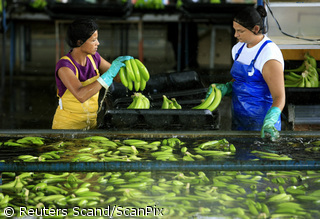Sweden Thrives on Exports One Year After Voters Reject the Euro
Published:
16 September 2004 y., Thursday
A year after Swedish Prime Minister Goeran Persson told voters his country needed the euro to compete in world markets, the Swedish economy has done a good job of proving him wrong.
The National Institute of Economic Research in Stockholm last month raised its economic growth forecast to 3.5 percent this year and 3 percent in 2005. A global expansion has boosted demand for Swedish exports while worker productivity has increased faster than in the 12 countries sharing the euro, which 56 percent of Swedish voters rejected on Sept. 14, 2003.
Swedish and international companies are betting on Sweden. Last month, for example, Atlet AB said it would close its forklift plant in Oberhausen, Germany, and move about 30 jobs to its factory in Moelnlycke, Sweden. Second-quarter foreign direct investment in Sweden jumped to a net 19.9 billion kronor ($2.7 billion), after a year-earlier outflow of 31.4 billion kronor.
The European Central Bank expects the economy of the euro region to expand about 1.9 percent this year and 2.3 percent in 2005. By one study, Sweden ranks second in the world in productivity.
Sweden, a nation of 9 million people that joined the European Union in 1994, accounts for 2 percent of the bloc's population and 2.7 percent of economic production. Its economy has grown faster than that of the euro region for eight of the past 10 years.
Šaltinis:
Bloomberg
Copying, publishing, announcing any information from the News.lt portal without written permission of News.lt editorial office is prohibited.
The most popular articles
 The EBRD is increasing the availability of financing to the real economy in Hungary, with a €50 million credit line to CIB Bank, including at least €10 million equivalent denominated in Hungarian Forint.
more »
The EBRD is increasing the availability of financing to the real economy in Hungary, with a €50 million credit line to CIB Bank, including at least €10 million equivalent denominated in Hungarian Forint.
more »
 At the end of March 2010, AB Bank SNORAS deposit portfolio exceeded LTL 5 billion, of which over LTL 3 billion are household deposits.
more »
At the end of March 2010, AB Bank SNORAS deposit portfolio exceeded LTL 5 billion, of which over LTL 3 billion are household deposits.
more »
 In affirmation of Vietnam’s remarkable progress towards Middle Income Country status, the World Bank Board of Directors today approved a second loan for Vietnam from the International Bank of Reconstruction and Development (IBRD).
more »
In affirmation of Vietnam’s remarkable progress towards Middle Income Country status, the World Bank Board of Directors today approved a second loan for Vietnam from the International Bank of Reconstruction and Development (IBRD).
more »
 The World Bank today approved a EUR26 million loan to the Republic of Croatia aimed at further improving the efficiency of Croatia’s justice system − a necessary process in Croatia’s path towards successful European Union accession.
more »
The World Bank today approved a EUR26 million loan to the Republic of Croatia aimed at further improving the efficiency of Croatia’s justice system − a necessary process in Croatia’s path towards successful European Union accession.
more »
 The ACP-EU Joint Parliamentary Assembly asked the European Commission to help EU and ACP banana producers adapt to the new EU-Latin America trade agreement, which is expected to put an end to fifteen years of “banana wars” between the two continents, but has raised concerns for the livelihood of some regions' producers.
more »
The ACP-EU Joint Parliamentary Assembly asked the European Commission to help EU and ACP banana producers adapt to the new EU-Latin America trade agreement, which is expected to put an end to fifteen years of “banana wars” between the two continents, but has raised concerns for the livelihood of some regions' producers.
more »
 As seventeen of Africa’s 53 nations celebrate 50 years of independence in 2010, Africa’s “golden moment has come” and investors around the globe must look to the continent often painted only as risk-prone if they are to capitalize on business opportunities.
more »
As seventeen of Africa’s 53 nations celebrate 50 years of independence in 2010, Africa’s “golden moment has come” and investors around the globe must look to the continent often painted only as risk-prone if they are to capitalize on business opportunities.
more »
 During the ordinary general shareholders’ meeting of AB Bank SNORAS, which took place on 31st March 2010, the bank’s profit distribution was approved.
more »
During the ordinary general shareholders’ meeting of AB Bank SNORAS, which took place on 31st March 2010, the bank’s profit distribution was approved.
more »
 The EU is the world's largest economy, with enough international clout to return to "real capitalism" rather than resign itself to an alien "financial capitalism", concluded MEPs and experts at a public hearing held on Thursday by Parliament's special committee on the crisis.
more »
The EU is the world's largest economy, with enough international clout to return to "real capitalism" rather than resign itself to an alien "financial capitalism", concluded MEPs and experts at a public hearing held on Thursday by Parliament's special committee on the crisis.
more »
 Food quality and labelling are likely to be key issues when the Common Agriculture Policy is overhauled in the coming years.
more »
Food quality and labelling are likely to be key issues when the Common Agriculture Policy is overhauled in the coming years.
more »
 The European Investment Bank (EIB) is lending EUR 250 million to Russian company Enel OGK-5 to finance the upgrading of a gas fired power plant located in Nevinnomyssk, South Russia.
more »
The European Investment Bank (EIB) is lending EUR 250 million to Russian company Enel OGK-5 to finance the upgrading of a gas fired power plant located in Nevinnomyssk, South Russia.
more »